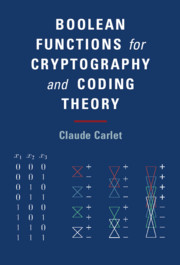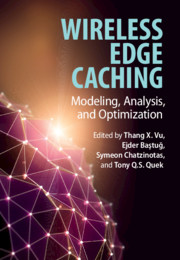Refine listing
Actions for selected content:
9096 results in Communications, Signal Processing and Information Theory
Part I - Fundamental Theories
-
- Book:
- Machine Learning for Speaker Recognition
- Published online:
- 26 June 2020
- Print publication:
- 19 November 2020, pp 1-2
-
- Chapter
- Export citation
Index
-
- Book:
- Machine Learning for Speaker Recognition
- Published online:
- 26 June 2020
- Print publication:
- 19 November 2020, pp 307-310
-
- Chapter
- Export citation
Preface
-
- Book:
- Machine Learning for Speaker Recognition
- Published online:
- 26 June 2020
- Print publication:
- 19 November 2020, pp xi-xiii
-
- Chapter
- Export citation
Notations
-
- Book:
- Machine Learning for Speaker Recognition
- Published online:
- 26 June 2020
- Print publication:
- 19 November 2020, pp xvi-xviii
-
- Chapter
- Export citation
7 - Dimension Reduction and Data Augmentation
- from Part II - Advanced Studies
-
- Book:
- Machine Learning for Speaker Recognition
- Published online:
- 26 June 2020
- Print publication:
- 19 November 2020, pp 249-265
-
- Chapter
- Export citation
List of Abbreviations
-
- Book:
- Machine Learning for Speaker Recognition
- Published online:
- 26 June 2020
- Print publication:
- 19 November 2020, pp xiv-xv
-
- Chapter
- Export citation
Contents
-
- Book:
- Machine Learning for Speaker Recognition
- Published online:
- 26 June 2020
- Print publication:
- 19 November 2020, pp v-x
-
- Chapter
- Export citation
1 - Introduction
- from Part I - Fundamental Theories
-
- Book:
- Machine Learning for Speaker Recognition
- Published online:
- 26 June 2020
- Print publication:
- 19 November 2020, pp 3-12
-
- Chapter
- Export citation
5 - Robust Speaker Verification
- from Part II - Advanced Studies
-
- Book:
- Machine Learning for Speaker Recognition
- Published online:
- 26 June 2020
- Print publication:
- 19 November 2020, pp 169-216
-
- Chapter
- Export citation
8 - Future Direction
- from Part II - Advanced Studies
-
- Book:
- Machine Learning for Speaker Recognition
- Published online:
- 26 June 2020
- Print publication:
- 19 November 2020, pp 266-275
-
- Chapter
- Export citation
References
-
- Book:
- Machine Learning for Speaker Recognition
- Published online:
- 26 June 2020
- Print publication:
- 19 November 2020, pp 289-306
-
- Chapter
- Export citation
Appendix - Exercises
-
- Book:
- Machine Learning for Speaker Recognition
- Published online:
- 26 June 2020
- Print publication:
- 19 November 2020, pp 276-288
-
- Chapter
- Export citation
6 - Domain Adaptation
- from Part II - Advanced Studies
-
- Book:
- Machine Learning for Speaker Recognition
- Published online:
- 26 June 2020
- Print publication:
- 19 November 2020, pp 217-248
-
- Chapter
- Export citation
2 - Learning Algorithms
- from Part I - Fundamental Theories
-
- Book:
- Machine Learning for Speaker Recognition
- Published online:
- 26 June 2020
- Print publication:
- 19 November 2020, pp 13-35
-
- Chapter
- Export citation
Frontmatter
-
- Book:
- Machine Learning for Speaker Recognition
- Published online:
- 26 June 2020
- Print publication:
- 19 November 2020, pp i-iv
-
- Chapter
- Export citation

Boolean Functions for Cryptography and Coding Theory
-
- Published online:
- 31 October 2020
- Print publication:
- 07 January 2021

Wireless Edge Caching
- Modeling, Analysis, and Optimization
-
- Published online:
- 19 October 2020
- Print publication:
- 11 March 2021
9 - A Framework for Cyber-Physical System Security Situation Awareness
- from Part III - Privacy, Security, and Protection
-
- Book:
- Principles of Cyber-Physical Systems
- Published online:
- 12 October 2020
- Print publication:
- 15 October 2020, pp 229-251
-
- Chapter
- Export citation
Dedication
-
- Book:
- Processing Networks
- Published online:
- 17 September 2020
- Print publication:
- 15 October 2020, pp v-vi
-
- Chapter
- Export citation
10 - Proportionally Fair Resource Allocation
-
- Book:
- Processing Networks
- Published online:
- 17 September 2020
- Print publication:
- 15 October 2020, pp 219-251
-
- Chapter
- Export citation
